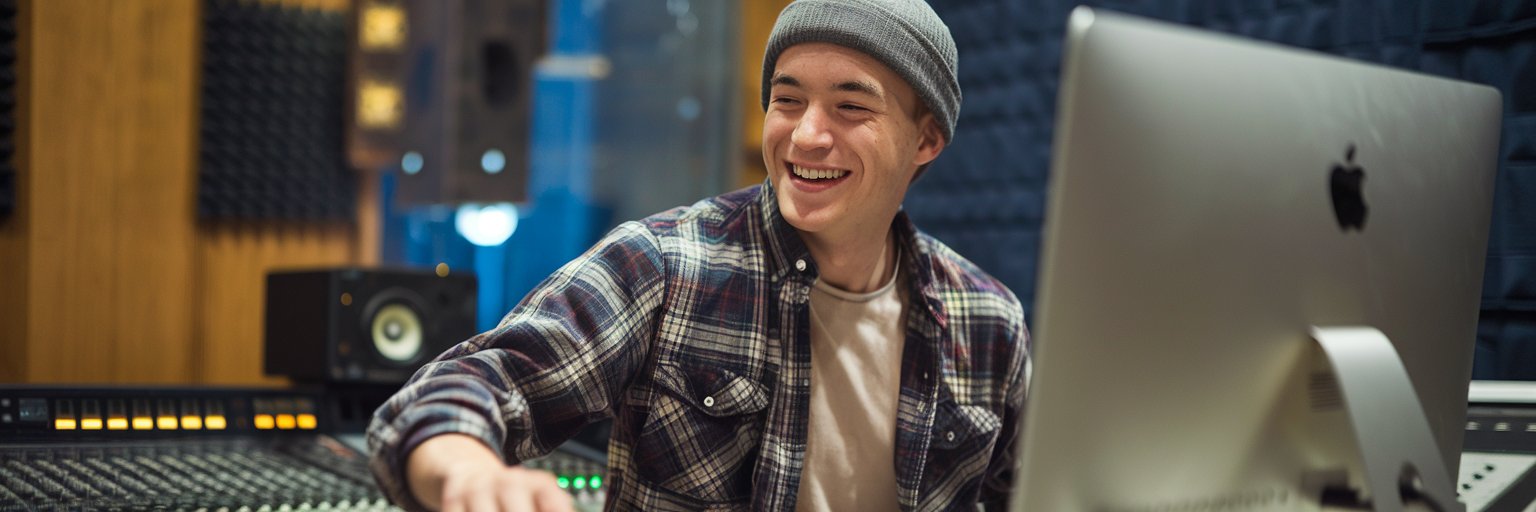Music Technology Level 2
Unlock your creativity and take your first step into the world of music production with the Level 2 Certificate in Music Technology. This programme is perfect if you are passionate about music and eager to learn how to create, record, and produce your own tracks using industry-standard software and equipment. Whether you dream of becoming a music producer, sound engineer, or DJ, this course provides the foundational skills to turn your passion into a career or hobby.
-
Description
Throughout the programme, you will explore the exciting world of music technology, learning how to transform your ideas into professional-quality audio. Some of the key areas covered include:
- Studio Recording Techniques: Learn how to set up microphones, manage acoustics, and record instruments and vocals.
- Audio Sequencing and Editing: Get hands-on experience with digital audio workstations (DAWs) to arrange, mix, and edit tracks.
- Music Production Software: Explore popular software like Logic Pro, Ableton, or Cubase, mastering the tools used by professionals.
- Mixing and Mastering: Understand how to balance sound levels, apply effects, and produce a polished final mix.
- Live Sound: Delve into the world of live events and gain insight into live sound engineering.
- Music Industry Insights: Learn about the business side of the industry, including copyright, licensing, and distribution.
Units covered may include the following:
- Exploring the music profession
- Composition
- Recording
- Development of music
- Exploring computer systems
- Computer music production.
-
Entry requirements
Five GSCE passes at grade 3 (D) or above, preferably to include Maths and English, or an equivalent vocational qualification at merit grade, and Functional Skills Maths and English, preferably at Level 1.
Students who have not yet achieved a grade 4 in GSCE Maths and English, study Functional Skills or GCSE Maths and English as part of their course.
This programme is designed for beginners, so no prior experience in music technology is necessary. However, a love for music and a keen interest in technology will be valuable. Basic computer skills are also recommended as you will be working with various software and digital tools. You need to be able to follow instructions, work as part of a team and be prepared to complete work outside of normal course hours, some of which will be in the evening.
-
Qualification
Level 2 Certificate in Music Technology
-
Progression
Upon completing this programme, you will have a solid foundation in music technology and be ready to take your skills further. You could move on to the Level 3 course in Music Technology, or even consider internships and entry-level roles in music production, live sound, or broadcasting. Whether you want to start a career in the music industry or just produce music for yourself, this certificate will set you on the right path.
-
Assessment
Your progress will be assessed through practical assignments, which might include producing tracks, recording live performances, or presenting your own mixes.
Assignments set have an agreed hand-in date that needs to be met in order to meet the awarding body guidelines. Some units may also include externally marked assessment material.
-
Home study
You will have approximately 6 - 10 hours per week of regular tasks to complete outside of class, including working on your own tracks, practising editing and mixing techniques, and completing written assignments on music technology concepts. These activities are designed to help you build your portfolio and improve your skills at your own pace.
-
Work placement
You may have the chance to participate in work experience where you can gain hands-on experience. You will also engage with inspiring speakers from the industry who will share insights about their roles and career paths. Additionally, you may have the opportunity to visit various workplaces to observe professionals in action.
-
Fees and additional costs
You are offered the opportunity to visit exhibitions and shows or to attend location sites and these may require you to pay entrance fees and coach costs. You may also benefit from purchasing text books, the details of these books will be discussed during induction when the latest edition of books will be recommended.
* Terms and conditions apply. The fees stated on this website are for guidance purposes only and should be checked before enrolment. Unless otherwise stated, fees shown are for tuition only, over one academic year. Where a course is longer than one academic year, the fees stated are for the first year, and the cost of the second or subsequent years will be discussed at interview. For details of fee remission for students over 19 click here. If you think you may be entitled to a concession or fee remission, or you would like more information on the additional costs associated with your chosen course, please contact us on 01635 845000 or email This email address is being protected from spambots. You need JavaScript enabled to view it..
